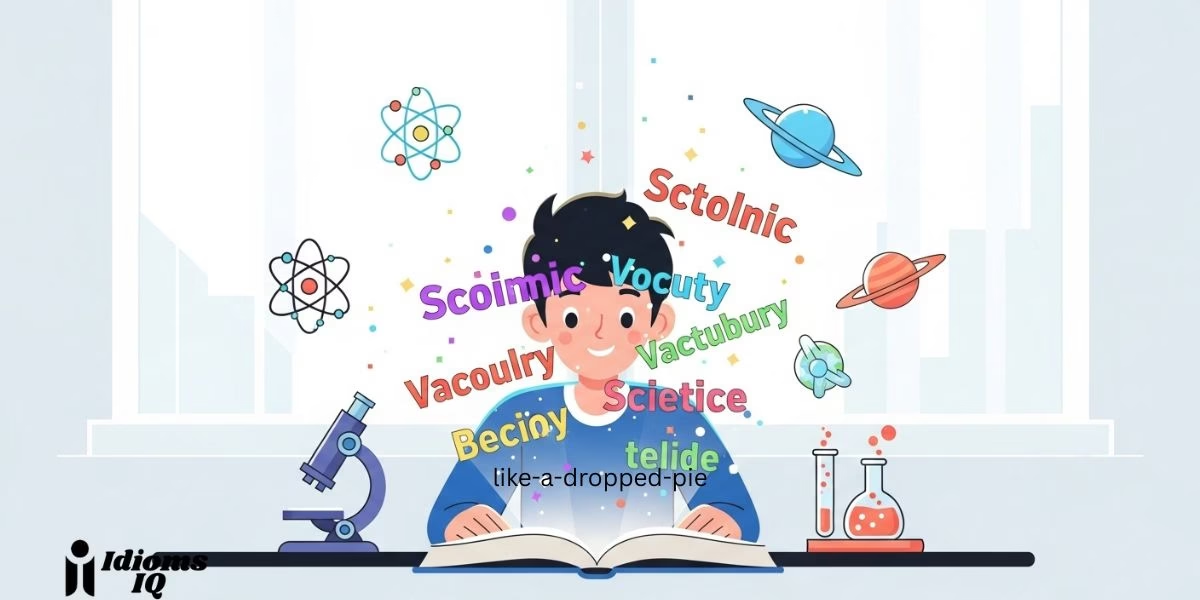
Key Highlights
- Discover how kinetic energy, ideal gas law, and other key “I” words boost your scientific information and classroom learning.
- Find out why building vocabulary with physical science words that start with “I” strengthens reading comprehension skills and cognitive abilities.
- Enjoy practical word search exercises and games to help you master science terms and have fun at the same time.
- See examples of beginner-friendly “I” words for kids, college students, and newcomers to science.
- Learn practical tips for using word lists and templates to improve your understanding.
- Uncover the best ways to use these terms in real-life science contexts and activities.
Related: 100 Science Words That Start With A for All Grade Levels
Introduction
Do you want to grow your science word list? In this blog, you get to learn physical science words that start with the letter “I.” When you pick up these words, from atomic mass to periodic table ideas, you see scientific information in a better way. This helps you keep up with your lessons in class.
It does not matter if you are fresh to science or you want to go over simple facts again, looking into these “I” words sets you on the right path. Are you set to go over what you need to know and find out how word power can help your learning in physical science?
Overview of Physical Science Words Starting with “I”

Physical science words that start with “I” are important for anyone learning about science. You can find words like ideal gas law, amount of light, ideal gas, and things to do with the hydrogen atom. These words come up in physics, chemistry, and general science. Knowing them will help build your background in physical science.
When you learn these “I” words, you get better at understanding science ideas. You start to see how topics like the ideal gas law or amount of light are part of a bigger picture in physics or chemistry. This strong base makes it easier for you to learn harder things later. As you get more interested in science, seeing these links helps a lot. Keep reading to find out how you can get better at using and knowing these words in physical science.
Importance of Learning Physical Science Vocabulary for Beginners
Starting to learn science can be tough. To help, it’s good to know key words, like the “I” words. It will make things easier for you. When you know basic ideas like kinetic energy and dependent variable, your reading comprehension skills get better. This helps you pick up new things in physical science. You will be able to solve problems faster and boost your cognitive abilities.
It is also good to know these words for word search exercises and activities in the classroom. If you know words like inertia, ideal gas, and intensity, you will feel sure about answering questions and talking with your teacher or classmates.
Kids and beginner students do well when they learn words that match how well they read. It makes science lessons easier and a lot more fun. So, starting with simple words and building your science vocabulary helps you do well as you move up to harder topics.
Key Areas in Physical Science Featuring “I” Terms
Let’s see how “I” words come up in different areas of physical science. You will see these words in physics, chemistry, and general science. Each one has its own use and some good examples.
In physics, there are ideas like kinetic energy and inertia. These help to show how objects move and what happens when a force acts on them. In chemistry, you learn about things like an ionic compound and the periodic table. These help us understand how things react and what makes up matter.
Here are some examples you may find:
- Kinetic energy: This tells what energy an object has because it moves.
- Periodic table: This sorts all the elements, like iodine, that have “I”.
- Ionic compound: This shows how atoms stick together by moving electrons from one to another.
- Ideal gas law: This links the pressure, volume, and temperature of gases.
When you use these words and ideas, you can learn about science in a better way. These ideas help you get ready for what may come up in science class or when you work on day-to-day problems in physical science.
Beginner’s Guide to Exploring Physical Science Words That Start with “I”

If you are new to this, learning physical science words that start with “I” can be simple. There are easy ways you can use to get better with words like perfect gas and ionic compound. You might use tools like Microsoft Word or try a word search game to help you.
This part will show you steps to find, understand, and use these “I” words. By using these ideas, you can feel sure about yourself, get better at reading comprehension skills, and like science more as you go. Are you ready to find out what you need to begin?
What You’ll Need to Get Started (Resources, Tools, and Helpful Tips)
Getting the right tools and resources is important when you start learning about physical science. Using a word search template is an excellent tool for any classroom. It can help students get better at reading comprehension skills, and it makes learning more fun. You can use Microsoft Word to make word search exercises with different difficulty levels. Pick a list of words, like atomic mass and ionic bonds, to keep students focused and help them learn key ideas. This way, your word search will support their learning, thinking, and skill growth in class.
Step 1: Identifying Common “I” Words in Physical Science
Spotting “I” words that show up a lot can make learning easier for you. Start by looking at textbooks, glossaries, or classroom charts. Look for terms such as ideal gas, inertia, and ion. You will see them used in lessons and science experiments.
Keep a list of words as you read. This will help you stay on top of new vocabulary. College students and beginners can use this tip when doing word search exercises or getting ready for exams.
You might see these “I” words often:
- Ideal gas: Follows the set science rules about pressure and temperature.
- Inertia: This is when something will not change the way it moves.
- Ion: It is an atom or molecule that gets an electric charge. It happens when it loses or takes in electrons.
- Intensity: This counts the amount of light or energy found in an area.
- Inclined plane: A flat area that is set at an angle. It is good to lift or move things.
When you know these words, you will find it easier to learn science and grow your vocabulary.
Step 2: Understanding Definitions and Contexts
Getting to grips with definitions helps you apply words in real-life settings. Check glossaries in textbooks or use online resources for clear explanations. Focus on how each word fits into experiments, diagrams, or scientific discussions, including independent variable or atomic number.
It’s also helpful to see words in context. For example, “atomic mass” is used when discussing the periodic table, while “ideal gas law” appears in chemistry problems.
Here’s a handy text table to help:
| Term | Definition |
|---|---|
| Inertia | Tendency of an object to resist changes in motion |
| Ion | Atom/molecule with positive or negative electric charge |
| Ideal Gas Law | Equation relating pressure, volume, and temperature (PV=nRT) |
| Independent Variable | Variable changed by the experimenter to observe effects |
| Atomic Mass | The mass of an atom, found on the periodic table |
| Intensity | Amount of light or energy per unit area |
| Inclined Plane | Sloped surface used to move objects |
This table will help you quickly remember and use these “I” words correctly.
Step 3: Using “I” Terms in Real-Life Examples and Activities
Using “I” words every day in science can help make what you learn stick better. You can start by looking for words like “flow of electrons” or “amount of light” when you do simple experiments or play games in class.
Try out some suitable word searches or worksheets, as these help you remember each idea. You can even look for “I” words in science news, while you do experiments, or when you talk with friends about what you learned.
Use these ways to practice:
- Build a basic circuit to watch the flow of electrons, which is the current.
- Measure the intensity, or amount of light, by shining a flashlight on different things.
- Finish a word search puzzle with “I” words to help you remember them.
When you use these terms in games or at work, you see how science connects to your everyday life. This makes it easier to understand.
Essential Physical Science Words Beginning with “I”
Learning key “I” words in physical science is a good idea. Words such as ionic compound, intermolecular force, and intramolecular force are often used in both beginner and higher-level classes.
This section shows why these words be important and sorts them into three topics physics, chemistry, and general science. If you work on solving problems, do experiments, or play word search games, knowing these terms helps you build a strong base. Now, let’s look at the most important words you need to know for each part.
Physics Terms Starting with “I” and Their Meanings
Physics uses many words starting with “I” to help you understand how things move, work together, or react to forces. You often get to know about kinetic energy, inertia, and the ideal gas law when reading textbooks or doing lab work.
If you talk about inertia, just know that it shows how something fights changes to the way it moves. This idea is very important in Newton’s laws. The ideal gas law is there to show how pressure, volume, and temperature come together in gases. It is good to know when you try science projects with balloons or anything in a closed can.
Here are some examples:
- Kinetic energy: The energy you see when something moves.
- Inertia: The way something stops itself from changing speed or direction.
- Ideal gas law: A rule in science that links together pressure, volume, and temperature for gases.
When you understand these words, you get better at reading scientific information and figuring out problems in class. You will know more about kinetic energy, gases, and how the ideal gas law is used.
Chemistry Terms Starting with “I” for Beginners
Chemistry has many easy “I” words that you will find in both lessons and labs. The ionic bond is a good example. This is how atoms stay together by moving electrons and holding on through electrostatic forces. The word ion is about atoms or molecules that get or lose electrons, which makes them charged.
The ideal gas constant is an important idea, too. It is used in the ideal gas law as the number that keeps things balanced in the equation. Isomers and isotopes are also must-know terms. Isomers show up when molecules use the same formula but build a different shape, while isotopes deal with the way atoms are put together.
Some examples for you to know:
- Ionic bond: This comes from the pull between ions with different charges.
- Ion: This is an atom or molecule that gets more or less electrons.
- Ideal gas constant: You use this when you work with the ideal gas law and the ideal gas equation.
- Isomers: These are things with the same formula, but the parts are connected in a new way.
If you take time to learn these “I” words like ideal gas law, ideal gas constant, ionic bond, and electrostatic forces, chemistry will get a lot easier to follow and understand.
General Science Vocabulary with “I” for Kids and Students
Kids and beginners learn better with science words that are simple and fun to use. Words like ideal gas, indicator, and insulator help get started with learning in a good way. IDEAL GAS talks about a kind of gas that acts based on set rules in science. This is used in many tests. INDICATOR is used to show a change in a chemical mix by showing different colors. INSULATOR stops the easy flow of electrons. Think about rubber or plastic that is wrapped around wires.
Here are three basic “I” words for kids:
- Ideal gas: A type of gas that acts by certain science rules.
- Indicator: A thing that shows a color change when chemicals mix.
- Insulator: A thing that blocks electricity from going through.
These words are easy to get and help make science feel more fun in class.
Interactive Ways to Learn and Practice “I” Words in Physical Science
Learning by doing is a great way for students to remember “I” science words. When you use a word search template, play word search games, or do simple experiments, you can improve your reading comprehension skills. These activities also make learning more enjoyable.
In the next parts, you’ll see some new ideas for practicing your vocabulary. You’ll find things like printable puzzles and easy classroom experiments. These hands-on and word search activities are good for people of every age. They will help you grow your confidence and learn more.
Fun Word Search and Puzzle Activities
Word search games are a great way to learn new words in science. These games can be fun for the entire class. You can use a word search template to make your own puzzles with a variety of different lengths and difficulty levels. The rows of letters are set up so players can look for and mark words like “inertia,” which you often see in physical science word searches.
Word searches help you test what you know and help build your memory. Teachers often print these games for the whole group, so every student has a chance to play.
Try these activities:
- Make your own word search with beginner “I” words and print it for your group.
- Ask your friends to finish a puzzle within a set time to make it more fun.
- Use puzzles with words from certain categories like physics, chemistry, or general science to help you study.
You can use these word search games on your own or with others. Either way, building your science word list will be easy and fun!
Hands-On Experiments and Classroom Ideas Using “I” Words
Bringing “I” terms to life with hands-on activities helps students remember lessons better. Teachers can set up experiments and show demos to the entire class using words like inertia and ideal gas.
For example, you can use things from home to do an inclined plane experiment and see how mechanics work. You can also try lifting ice with a string. This simple experiment helps people build problem-solving skills and practice making predictions in science.
Here are some classroom ideas:
- Set up an inclined plane. Measure how objects move to learn about inertia.
- Do an ice lifting experiment using string and salt. Test some simple physical properties.
- Build a circuit with insulators and conductors. Watch the flow of electrons.
These hands-on activities help students get a deeper understanding. They also encourage teamwork and make students more curious.
Conclusion
To sum up, learning physical science words, especially the ones that start with I, can help you better understand the basics. If you look into why inertia is important in physics or find out what ions are in chemistry, learning these words will help you as a beginner.
Taking part in different activities, like puzzles or simple experiments, will make it easier to remember what you learn. This also makes the process more fun. Keep in mind, knowing these words well is important if you want to do well in physical science.
If you want to learn more and get advice just for you, feel free to ask for a free talk with our experts!


